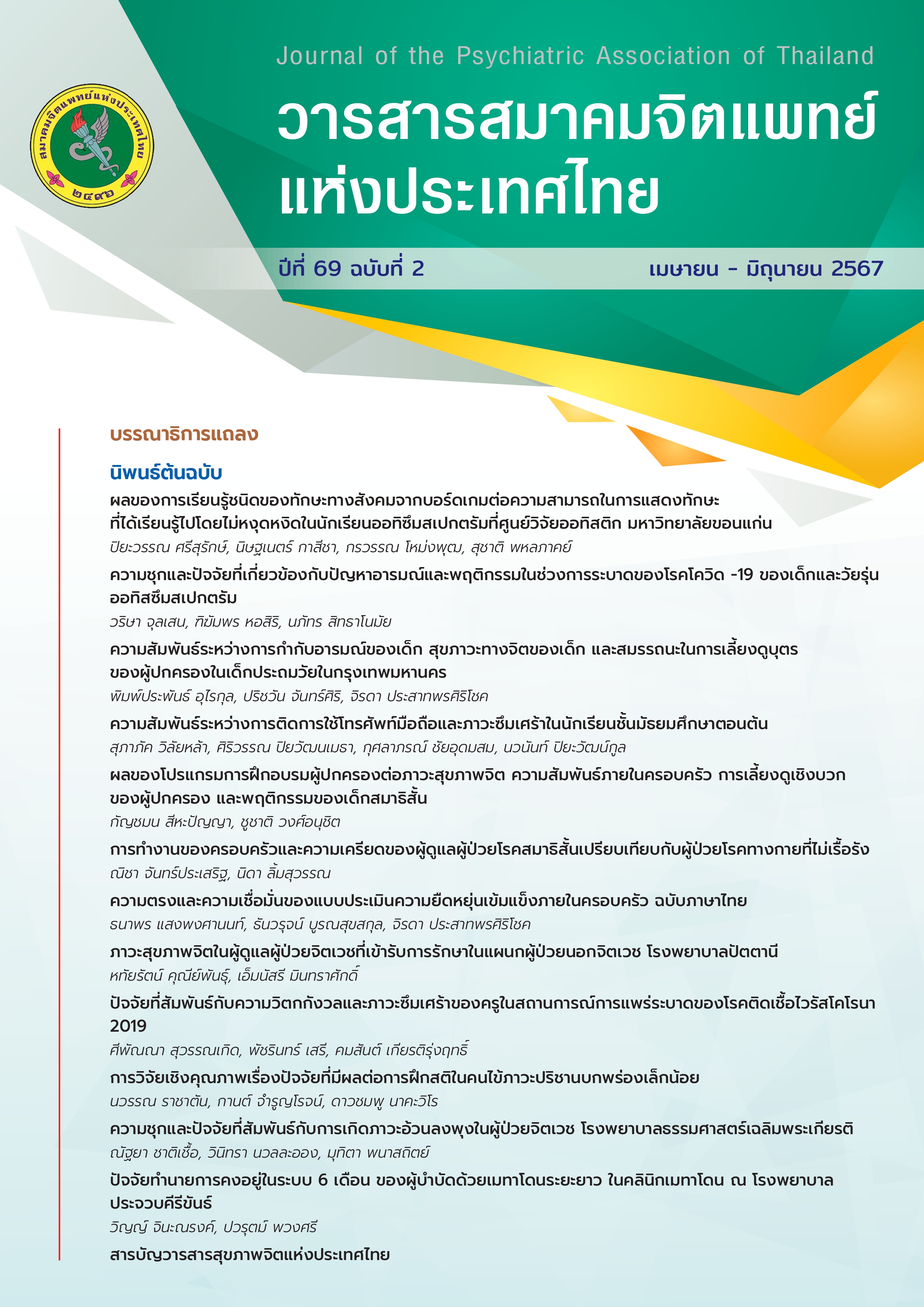Factors Influencing Mindfulness Practice in Patients with Mild Cognitive Impairment: A Qualitative Research Study
Main Article Content
Abstract
Objective: To study the factors influencing mindfulness training and suitable mindfulness practice model for patients with mild cognitive impairment (MCI)
Methods: This qualitative study included 10 participants, comprising healthcare professionals with at least 1 year of mindfulness training experience and experience treating patients with MCI (5 participants) and patients with MCI who had undergone mindfulness practice for at least 6 months at Ramathibodi Hospital (5 participants). Data was collected through semi-structured interviews, and subsequently, content analysis was employed to analyze the gathered information.
Results: Factors which promote mindfulness practice were categorized into internal and external factors. Internal factors included intention and having a positive attitude towards mindfulness, while external factors encompassed social support, suitable training methods, and a conducive environment. These factors could either support or hinder mindfulness practice. Other external factors which promoted mindfulness practice included social roles, religion, or personal beliefs. Other external factors that served as obstacles to mindfulness practice included lack of training skills, poor socioeconomic status, poor health, and fatigue from daily routines.
Conclusion: To promote mindfulness practice in individuals with MCI, encouraging a strong intention to practice mindfulness is crucial. This involves fostering a positive mindset, emphasizing the importance and benefits of mindfulness, and highlighting the control it provides over one’s behavior. Consistent and clear goal-setting for mindfulness practice is essential. Additionally, social support from friends, family, influential individuals in the community, and government support can play a significant role in motivating individuals to engage in mindfulness practice together. Creating supportive environments for mindfulness practice, simplifying and adapting mindfulness techniques to daily life, will make it more accessible for individuals with MCI, enabling them to engage in regular mindfulness practice.
Article Details

This work is licensed under a Creative Commons Attribution-NonCommercial-NoDerivatives 4.0 International License.
Articles submitted for consideration must not have been previously published or accepted for publication in any other journal, and must not be under review by any other journal.
References
World Health Organization. Dementia 2021 [Internet]. Geneva: WHO; 2021. [cited 2022 Apr 10]. Available from: https://www.who.int/news-room/fact-sheets/detail/dementia.
Morris JC, Storandt M, Miller JP, McKeel DW, Price JL, Rubin EH, et al. Mild cognitive impairment represents early-stage Alzheimer disease. Arch Neurol 2001; 58(3): 397-405.
Grundman M, Petersen RC, Ferris SH, Thomas RG, Aisen PS, Bennett DA, et al. Mild cognitive impairment can be distinguished from Alzheimer disease and normal aging for clinical trials. Arch Neurol 2004; 61(1): 59-66.
Petersen RC. Mild cognitive impairment as a diagnostic entity. J Intern Med 2004; 256(3): 183-94.
American Psychiatric Association. Diagnostic and statistical manual of mental disorders, fifth edition. Washington, D.C.: American Psychiatric Association; 2013.
Tábuas-Pereira M, Baldeiras I, Duro D, Santiago B, Ribeiro MH, Leitão MJ, et al. Prognosis of early-onset vs. late-onset mild cognitive impairment: comparison of conversion rates and its predictors. Geriatrics (Basel) 2016; 1(2): 11.
DeCarli C. Mild cognitive impairment: prevalence, prognosis, aetiology, and treatment. Lancet Neurol 2003; 2(1): 15-21.
Petersen RC, Lopez O, Armstrong MJ, Getchius TSD, Ganguli M, Gloss D, et al. Practice guideline update summary: mild cognitive impairment: report of the guideline development, dissemination, and implementation subcommittee of the American Academy of Neurology. Neurology 2018; 90(3): 126-35.
Cotelli M, Calabria M, Manenti R, Rosini S, Maioli C, Zanetti O, et al. Brain stimulation improves associative memory in an individual with amnestic mild cognitive impairment. Neurocase 2012; 18(3): 217-23.
Deng M, Wang XF. Acupuncture for amnestic mild cognitive impairment: a meta-analysis of randomised controlled trials. Acupunct Med 2016; 34(5): 342-8.
Forlenza OV, Diniz BS, Radanovic M, Santos FS, Talib LL, Gattaz WF. Disease-modifying properties of long-term lithium treatment for amnestic mild cognitive impairment: randomised controlled trial. BJPsych 2011; 198(5): 351-6.
Ludwig DS, Kabat-Zinn J. Mindfulness in medicine. JAMA 2008; 300(11): 1350-2.
Wong WP, Coles J, Chambers R, Wu DB, Hassed C. The effects of mindfulness on older adults with mild cognitive impairment. J Alzheimers Dis Rep 2017; 1(1): 181-93.
Yu J, Rawtaer I, Feng L, Fam J, Kumar AP, Kee-Mun Cheah I, et al. Mindfulness intervention for mild cognitive impairment led to attention-related improvements and neuroplastic changes: results from a 9-month randomized control trial. J Psychiatr Res 2021; 135: 203-11.
Disayavanish C, Disayavanish P. Mindfulness-based dynamic psychotherapy. J Psychiatr Assoc Thailand 2014; 59(3): 179-94.
Ajzen, I. Theory of planned behavior diagram [Internet]. Massachusetts: University of Massachusettes Amherst; 2019. [cited 2021 Oct 10]. Available from: https://people.umass.edu/aizen/tpb.diag.html.
Atkins L, Francis J, Islam R, O’Connor D, Patey A, Ivers N, et al. A guide to using the theoretical domains framework of behaviour change to investigate implementation problems. Implement Sci 2017; 12(1): 77.
Sucich JT, Lehrer J, Breitbart V, Julliard KN. Mindfulness training for community-based psychotherapists: a feasibility study. Pilot Feasibility Stud 2022 8(1): 250.
Wells RE, Kerr C, Dossett ML, Danhauer SC, Sohl SJ, Sachs BC, et al. Can adults with mild cognitive impairment build cognitive reserve and learn mindfulness meditation? qualitative theme analyses from a small pilot study. J Alzheimers Dis 2019; 70(3): 825-42.
Lenze EJ, Voegtle M, Miller JP, Ances BM, Balota DA, Barch D, et al. Effects of mindfulness training and exercise on cognitive function in older adults: a randomized clinical trial. JAMA 2022; 328(22): 2218-29.
Berk L, Warmenhoven F, van Os J, van Boxtel M. Mindfulness training for people with dementia and their caregivers: rationale, current research, and future directions. Front Psychol 2018; 9: 982.


